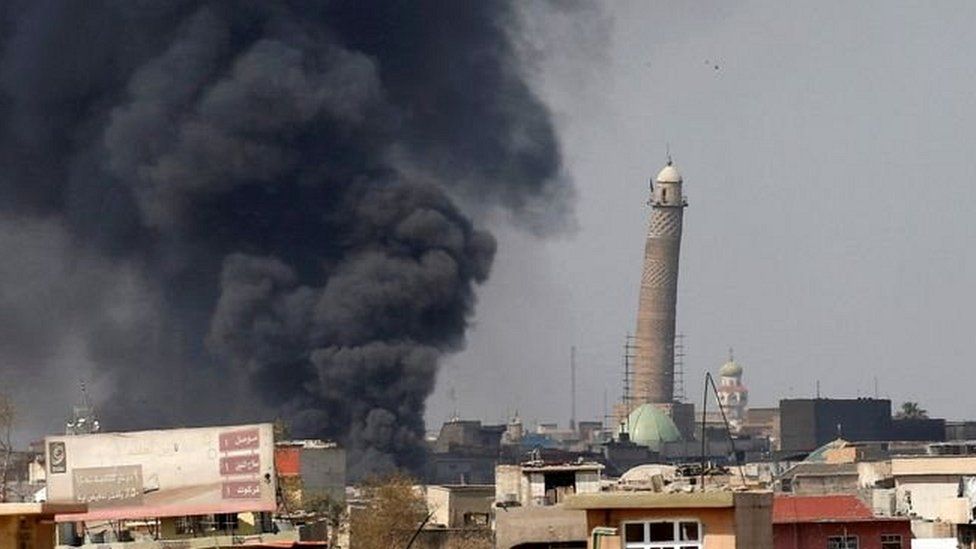The end of ISIS?
June 22, 2017 | Expert Insights

For centuries it stood as one of the most famous monuments in a city where many battles and wars fought and it stood as a witness to the will of the people. And yet, on June 21, 2017, it was reported that forces of the Islamic State (ISIL or ISIS) had destroyed the Great Mosque of al-Nuri and its famous leaning minaret in the city of Mosul.
Iraqi military has claimed that the militant organization had blown up the religious landmark in midst of an ongoing military conflict between ISIS and a joint offensive by Iraqi government forces with allied militias.
Iraqi Prime Minister Haider al-Abadi announced that this latest act was “an official declaration of defeat" from ISIS. While ISIS has claimed that it was the US military forces that destroyed the mosque (a claim that the US has since denied), the destruction of this structure is likely to lead to the dismantling of one of the most violent militant groups that the world has seen in recent years.
“The hunchback” of Mosul
Built sometime during late 12th century, the mosque was built by Nur ad-Din Zangi, who reigned over the Syrian province of the Seljuk Empire as a member of the Turkish Zengid dynasty. He is a revered figure in the region with tales of his battles against the Crusades regarded as legendary victories. Over the years, there have been many renovations that have taken place to restore the mosque including one project that was initiated in 1942. And despite the fact the region was the battleground for several conflicts including the US invasion of Iraq in 2003, the structure itself survived.
It all started to change in 2014, when ISIS took over large parts of the city of Mosul and emerged as a prominent militant group in the world. Legend has it that ISIS forces tried to destroy the structure back in 2014 but a group of citizens formed a human chain protecting the monument. The mosque then became significantly important to ISIS itself as its leader Abu Bakr al-Baghdadi made his first and only public appearance in that location and declared a “caliphate”.
Since that moment, reports emerged of large-scale atrocities being committed by ISIS forces in the region including executions and even enslavement. Hundreds of thousands fled the region when they could. It was reported that ISIS during various conflicts with Iraqi forces used civilians as shields. Recently UNICEF said that the group was punishing the families of those trying to flee by killing their targeting and killing their children.
However despite the heavy fighting that has taken place for control of the region, ISIS has been losing all the ground it claimed back. According to the US Defense Intelligence Agency as of May 2017 ISIS has lost 65 percent of its land in Iraq and 45 percent in Syria since 2014.
Analysis
In October 2016, the Iraqi army launched one of its most aggressive offensive against ISIS by besieging areas controlled by ISIS in regions surrounding Mosul. This offensive was called Operation We Are Coming, Nineveh. By the 1 November the forces entered the city of Mosul and began one of the biggest offenses against the militant group. By February 2017, the Iraqi army had recaptured western Mosul.
For ISIS itself the destruction of the mosque will be a symbolic defeat as not only does it traditionally represent the victory of Islam against other forces (in particular Christianity and Western forces) but it was the location where the group’s de-facto leader had declared caliphate. Economically too the group has suffered greatly wherein its revenue dropped from $1.9b in 2014 to about $870m in 2016.
Assessment
Our assessment is that, the ISIS continues to lose ground and is also economically reaching a point where it won’t be able to sustain itself. This means its vision of an “Islamic State” is very likely at the precipice of destruction. For all intents and purpose, this has to be seen as a failure. However our assessment stands that this will not put an end to the terror attacks it carries out in Western countries. It is very possible that freed from having to defend any actual land, ISIS will scramble to set new goals for success in order to attract new recruits and will focus on carrying out various acts of international terrorism. Hence, Western regions ought to prepare themselves for that possibility.








Comments